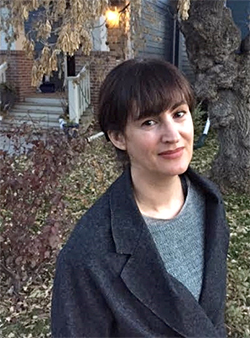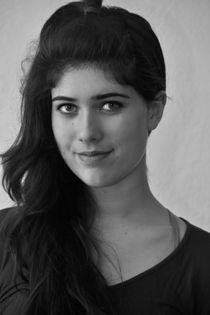Necessary Threads: Sophie Underwood in Conversation with Jacqueline Baker

Malahat fiction board intern Sophie Underwood talks with Novella Prize judge Jacqueline Baker about the horror genre, ghost stories, and a near-death experience.
Jacqueline Baker is the author of A Hard Witching & Other Stories and The Horseman's Graves. Her latest novel, The Broken Hours, is a literary ghost story about the final months of the life of horror icon H. P. Lovecraft. After years of living off grid in the British Columbia interior, Jacqueline Baker lives in the metropolitan centre of Edmonton. Read more here.
Click here for details on entering the Novella Prize contest.
Novellas straddle the line between short fiction and novels. How would you define this in-between form, and why is there a place for it in fiction? What will you be looking for in novella submissions?
They do straddle the line, but are distinctly their own literary genre. I think we sometimes mistakenly label short novels as novellas strictly according to length. But it is more than just length that defines the novella. Traditionally, the novella involves the protagonist encountering someone/witnessing something/experiencing something that precipitates a reversal of fortune, or a turn of events, leading to some sort of forceful conclusion. Not a twist, exactly, but certainly a dramatic end. The classic example of this would be Death In Venice. What will I look for? I suppose I'd like to see what writers do with the form. The novella is a tighter structure — and usually a more singular focus — so there isn't a lot of room for movement. You can get away with whatever you can get away with, Flannery O'Connor said, but no one's ever gotten away with much. Personally, I probably look for story above all else. Like any reader, I want to be engaged, I want to be entertained, I want, as Carver said, some news of the world. I want to believe in the world set before me, I want to feel that the characters have walked into my life.
Before your first novel, A Horseman’s Graves, you focused mainly on short stories. How did you delve into writing your first novel, and how did the process differ from writing shorter pieces? Do you have any advice for writers hoping to tackle longer fiction for the first time?
It's such a different set of requirements, isn't it. I think my first love is still the short story. I love the intensity of it, the focus, the way it challenges the writer to make every word count. To build a whole world in such a little space. The novel on the other hand seems to require a breadth of vision, a capacity to bring in all the necessary threads and weave them through consistently — or, if inconsistently, with intention. It's such an orchestration, really. To switch metaphors. Well, who knows. When I read short stories, I love them best. When I read novels, I love them best. The same is true for novellas. When I'm writing them, I despise them all. But only for a little while. (And not really.)
Your work (particularly the short story collection A Hard Witching) has been compared to Alice Munro’s. You have also been compared to J.D Salinger and Cormac McCarthy. Do you feel these comparisons are apt, and which other authors have influenced your writing?
Yes, they are very apt. Ha ha. No. My writing is nothing like theirs, though I'm sure like any writer I learn/borrow/steal from those I admire. And who is not flattered to be compared to a writer one admires? I admire them all -- Munro, McCarthy, Salinger — for different reasons. McCarthy. Is there anyone really like McCarthy? Who knows how these comparisons happen. We must be compared to something, I suppose. And no one has suggested Gal Godot. Or Robert Downey Jr.
Your biography on the MacEwan University website lists “horror: film and literature” as one of your many expertises. How cool! Can you tell us a little bit about this?
Expertise is a stretch. Really, I'm just a lifelong lover of the genre. I was drawn to it from an early age. I remember sitting up alone at night, I must have been around six, watching the old Frankenstein. I read everything by King, whatever other horror I could lay my hands on. One that stands out was called, I think, The Moonchild. I can't remember the author's name. None of it ever bothered me. Now it scares the hell out of me. Which is part of the fun, so I love it even more. There is nothing worse than watching a horror movie with someone determined to be unmoved by it, to point out the implausibilities, the tropes. I don't like the slasher stuff, more the psychological horror. I'm a sucker for a good ghost story.
Do you have a writing routine to help your process? Is there a particular place / time of day / mindset that helps you do your work?
I have kids. I teach six courses a year. I fit the writing in whenever and wherever I can. Like many writers, I can't afford to be precious about it.
What is your favourite thing you’ve ever written, and why?
A sentimental poem to my mother. When I was 19. I typed it up and framed it and wrapped it and put it under the tree for Christmas. This was in Saskatchewan, in the middle of a cold snap, -30 something without the wind chill. It was Christmas Eve and I'd driven to the next town over with some friends for a party. They needed a designated driver. A fog rolled in, they'd both had a lot to drink. I was driving and I lost my way, ended up going down some snowed over prairie trail through a field in the middle of nowhere. And then the car died. My friends sobered up. We were idiots, not dressed for the weather. I was wearing a suede jacket and sneakers. No socks. No hats, mitts, scarves. Nothing. We sat there a long time. I've never been so cold. We checked the trunk. It was my friend's dad's car. We found a Christmas present and unwrapped it, hoping it was something warm. It was lingerie my friend's dad had bought for my friend's mom. My friend tied it around his head to keep his ears warm. The night went on forever. I thought we were going to die there. I'm surprised we didn't. I might have cried a little. But, you know, not hysterically. Then my other friend pulled out a little box from his jacket. It was the engagement ring he was going to propose to his girlfriend with. And then I remembered the poem at home under the tree and I thought about us all freezing to death and then my mom having to open that poem. So as soon as dawn came I said I couldn't sit there anymore and I was going to find a farm or die trying. So we walked out into this vast white nothing. We couldn't see any farms. It was Saskatchewan. I don't know how long we walked. Eventually we found a farm. My friend said, What if no one's home? And I thought, I'm breaking a f*cking window. I don't know what we were worried about. No one locked their doors there. Anyway, we lived. I should write that story someday.

Sophie Underwood
* * * * * * * *









